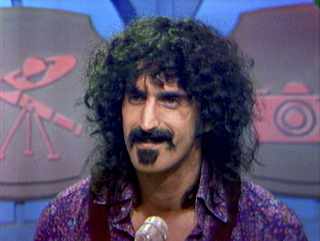
Frank Zappa appearing on What’s My Line in 1971 (Fremantle Media North America/Sony Pictures Classics)
This portmanteau of the eponymous 1960’s counterculture figure uses filmed interviews and television appearances to create a portrait of a prickly, uncompromising man. Eschewing the normal rock bio-doc format, it doesn’t use a narrator to provide context, assuming you have a basic understanding of the culture that Frank Zappa came from, and it doesn’t hold your hand to explain the various revolutions going on in the ’60s. It’s all the better for it. There is no insight into Zappa’s private life, no super 8 home movies, and no talking heads of surviving family and friends, just the man’s public persona, which is way more compelling than well-trodden tropes.
Zappa was a strangely handsome and magnetic man. He had a big nose and a goatee reminiscent of a pirate, a look that was consistent across his decades of public life. His voice seemed naturally sardonic, its low tenor and slow delivery suggesting he’s saying something knowingly controversial—and he usually was. His wit comes out in full force during a long section during the 1980s, when he fights against parental approval warnings in the music industry, which he says will inevitably lead to censorship. The footage reveals him to be so much smarter than any of the enraged moralists. Indeed, Zappa gets in so many good quips that one imagines that if these debates happened today, one’s social media feed would be littered with links to Huffington Post articles titled, “Frank Zappa DESTROYS Crusading Conservatives.”
Usually in movies like this, the filmmaker will present the artist’s work as something to be unquestionably revered. However, unquestioning reverence just doesn’t fit the film’s subject. Personally, this writer finds Zappa’s mix of avant-garde structures and pop and rock hooks often thrilling, yet his very literal lyrics can be underwhelming. Also, for a man who can be so funny when given an opponent to bounce off, he can also seem cruel alone on his own canvas. In a song like “Bobby Brown,” for example, Zappa seemingly equates sexual kinks to American capitalism, but in a way that feels strained and wrong-headed in today’s sex positive world. It includes homophobic lyrics that a certain set of straight white male fans would doubtlessly bend over backwards to dignify.
But no matter what your reaction to his music, that won’t hinder your enjoyment of Eat That Question: Frank Zappa in His Own Words. Chronologically edited, time passes in a way that can be jarring at times. Suddenly, and without fanfare, the subject’s health has declined and he is sporting a beard instead of his iconic facial hair. Staying true to its format, there is no text at the end explaining when he died and how he has influenced x, y, and z musician. The film leaves the man doing what he loved best and never stopped doing: working on his music. The respect for that is contagious.






Leave A Comment